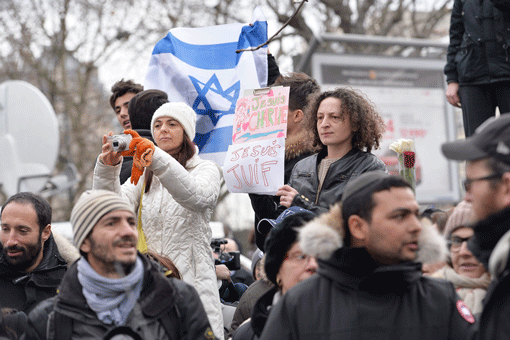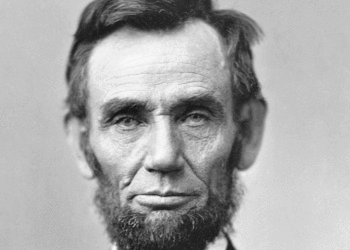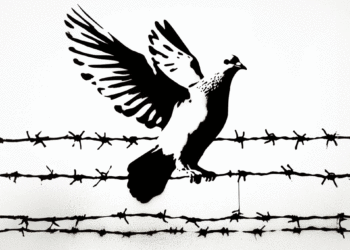Killing Jews does not provoke the same surprise as killing cartoonists in the heart of Paris
By BRUNO CHAOUAT
In her famous essay on anti-Semitism published in The Origins of Totalitarianism, Hannah Arendt tells this sinister joke, making the rounds after World War I: “An anti-Semite claimed that the Jews had caused the war; the reply was: Yes, the Jews and the bicyclists. Why the bicyclists? asks the one. Why the Jews? asks the other.”
In January, that sinister joke was uncannily revived. Islamist terrorists killed Jews and cartoonists.
And France and the Western world, in shock, asked: Why the cartoonists?
The great march of January 11 was mobilized in support of the victims and survivors of Charlie Hebdo. Indeed, after Mohammed Merah’s 2012 Toulouse rampage, wherein those murdered included a rabbi and three Jewish children targeted as such, there was no national march, no national or international mobilization.

Killing Jews, although it would be disingenuous to claim that it leaves people indifferent — it does not — nonetheless does not provoke the same surprise as killing cartoonists in the heart of Paris. It does not generate a national and international outcry, and official mourning. Killing Jews, even today, in Paris, is “understandable,” or at least expected. It’s far from routine, far from normal, and I am not in the least suggesting that people are jaded or numbed.
They are not.
But harassing and killing Jews partake of a historical pattern of pogroms, and murderous and genocidal anti-Semitism. French Jews have not forgotten former Prime Minister Raymond Barre’s anti-Semitic blunder, in the aftermath of the bombing of the rue Copernic synagogue in 1980, an attack that killed Jews and passersby: referring to the latter, Barre expressed outrage that the terrorists had killed “innocent victims.” Why the non-Jewish passersby?
And then again: Why the cartoonists?
I do not claim to have an answer to that troubling question, but I can offer my surmise. I would argue that there is more correlation between Jews and cartoonists than between Jews and, say, bicyclists. This is not because humor and satire would be inherently Jewish (there are very serious and gloomy Jews out there); this is not because every satirist, in the mind of anti-Semitic and humorless Islamists, is an honorary Jew.
Why cartoonists, then? Perhaps because political cartoons, and especially those in Charlie Hebdo, embody a French anticlericalism and secularism rooted in a ruthless critique of institutionalized religion that started with the Enlightenment. And because the ruthless critique of established religion, and anticlericalism, which ultimately led to the separation of church and state in France and elsewhere, has been good for the Jews since the emancipation of Jewry in the 18th and early 19th centuries. An attack on anticlerical cartoonists is an assault on that separation, an attempt at re-establishing an official religion, and that, needless to say, would turn out to be bad for the Jews.
Murdering police officers, anticlerical journalists and Jews is thus politically coherent; it is dealing a deadly blow to the French Republic. For the jihadists it means winning, if not the war, then at least a battle against France.
Democracies are, by nature, vulnerable. The 9/11 terrorists turned the openness of democratic societies against those societies. Today, liberal democracies find themselves in an unprecedented and inextricable predicament. They have to fight on two fronts: first, against terrorism, through law enforcement and prevention; and, second, on what I would call a psychological front, for lack of a better word.
Indeed, ideologues of political Islam master the discourse of human and minority rights, and of antiracism, and they know how to use it against Western democracies. Former radical Islamist, British Pakistani Maajid Nawaz, in his courageous memoir, Radical: My Journey Out of Islamist Extremism, recalls that in the 1990s, in order to push the agenda of Islamist radicalism on British campuses, the militants cynically exploited the rhetoric of antiracism.
If we want to fight Islamist terrorism effectively, we must therefore not give in to the kind of intimidation that builds on what French essayist Pascal Bruckner has called “Western masochism,” the paralyzing feelings of guilt and attempts at repentance for the crimes of colonialism and slavery — a guilt that prevents the West from identifying the new faces of terror and tyranny. We must stop engaging in a guilt trip that justifies terrorist acting-out. We must reject the political manipulations that lead to censorship and self-censorship by accusing those who support satire and free speech of being “insensitive” and of “hurting the feelings of believers.”
At this juncture, it is crucial to say that condemning Islamist terrorism does not amount to racism or xenophobia. Fortunately, more and more pundits (in French and European newspapers, and in the New York Times), and Muslim secular voices are now denouncing that intimidation, and especially the spinelessness of politicians (in Europe and in the U.S.) who are reluctant to associate explicitly terrorist crimes with Islam, for fear of being accused of Islamophobia and racism, or perhaps for more pragmatic reasons that have to do with diplomacy and geopolitical strategy.
To refuse to recognize that jihadism builds on narratives and myths of the early centuries of Islam (for example, see Graeme Wood’s “What ISIS Really Wants,” The Atlantic, March 2015) is as inane as to claim that Nazism had nothing to do with German and European Christian culture. It did, although Nazism was also a perversion of the German and European cultural legacy.
Likewise, we should hope that the Islamic tradition has more and better to offer to young Muslims in the West than the narratives of humiliation, and anti-Semitic and anti-modern resentment that are the trademark of ISIS or al-Qaeda.
***
Bruno Chaouat is a professor and chair of the Department of French and Italian at the University of Minnesota.
(American Jewish World, 2.27.15)



















